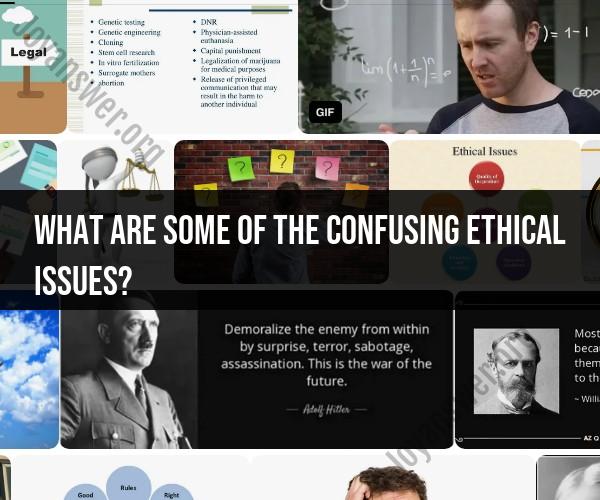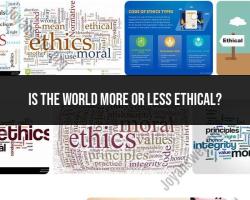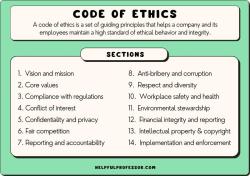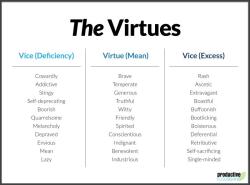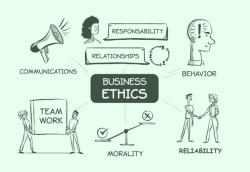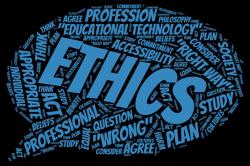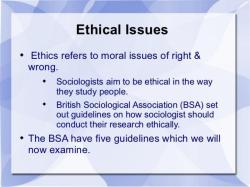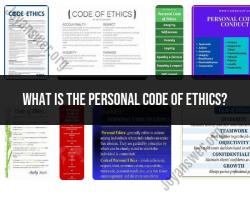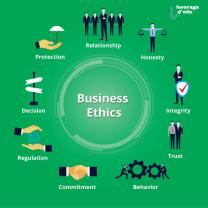What are some of the confusing ethical issues?
Complex ethical issues can arise in various areas of life, including healthcare, technology, business, politics, and personal relationships. These issues are often challenging to navigate because they involve competing values, interests, and principles. Here are some examples of confusing ethical issues in different domains:
Medical Ethics:
- End-of-Life Decisions: Determining when and how to end life-sustaining treatment for a terminally ill patient.
- Organ Transplants: Deciding how to allocate limited organs among a pool of potential recipients.
- Medical Research: Balancing the potential benefits of medical research with the need to protect human subjects.
Technology and Privacy:
- Data Privacy: Balancing the collection of user data for technology advancements with individuals' privacy rights.
- Artificial Intelligence: Addressing issues related to bias, discrimination, and accountability in AI systems.
- Surveillance: Weighing the benefits of surveillance for security against potential invasions of privacy.
Business Ethics:
- Corporate Social Responsibility (CSR): Determining the responsibilities of businesses toward the environment, employees, and communities.
- Ethical Marketing: Dealing with issues of truth in advertising and responsible product promotion.
- Whistleblowing: Deciding when and how to report unethical practices within a company.
Political Ethics:
- Campaign Finance: Addressing concerns about money's influence on political campaigns and decisions.
- Political Lobbying: Assessing the ethics of influencing politicians through lobbying efforts.
- Gerrymandering: Examining the fairness and ethics of drawing electoral districts.
Environmental Ethics:
- Climate Change: Determining responsibilities for addressing climate change and its impact on future generations.
- Biodiversity Conservation: Balancing human development with the preservation of ecosystems and species.
- Resource Allocation: Allocating scarce resources, such as water, in an equitable and sustainable manner.
Personal Relationships:
- Infidelity: Navigating the ethical considerations when one partner is unfaithful in a relationship.
- Family Conflicts: Addressing ethical dilemmas related to family disputes, including inheritance, caregiving, and custody battles.
- Friendship and Loyalty: Balancing loyalty to one friend with moral obligations to another in a conflict.
Criminal Justice:
- Death Penalty: Debating the ethics of capital punishment.
- Racial Profiling: Addressing the ethical concerns related to law enforcement practices that disproportionately target specific racial or ethnic groups.
- Sentencing and Rehabilitation: Balancing the principles of punishment, deterrence, and rehabilitation in the criminal justice system.
These are just a few examples, and there are many more complex ethical issues that individuals and societies must grapple with. Ethical dilemmas often involve weighing conflicting values and principles, and finding a resolution can be difficult, as there may not be a one-size-fits-all answer. The process of addressing such issues typically involves thoughtful analysis, dialogue, and consideration of the potential consequences of various courses of action. It can also benefit from the guidance of ethical frameworks and principles.
What are some complex and perplexing ethical issues faced in various fields?
Here are some examples of complex and perplexing ethical issues faced in various fields:
- Artificial intelligence (AI): AI raises ethical concerns about privacy, bias, autonomy, and accountability. For example, how can we ensure that AI systems are used fairly and ethically? How can we prevent AI systems from being used to harm or discriminate against people?
- Biotechnology: Biotechnology raises ethical concerns about gene editing, human cloning, and the use of animals in research. For example, is it ethical to edit the genes of human embryos? Is it ethical to clone humans? Is it ethical to use animals in research?
- Climate change: Climate change raises ethical concerns about environmental justice, intergenerational responsibility, and the role of human activity in the climate crisis. For example, how should we allocate the costs and benefits of climate change mitigation and adaptation? How should we ensure that climate change policies are fair to all people?
- Healthcare: Healthcare raises ethical concerns about resource allocation, informed consent, and end-of-life care. For example, how should we allocate scarce healthcare resources? How can we ensure that patients are fully informed about the risks and benefits of medical treatments? How should we make decisions about end-of-life care?
- Media: Media raises ethical concerns about truthfulness, privacy, and harm. For example, how can we ensure that news reporting is accurate and truthful? How can we protect the privacy of individuals who are featured in the media? How can we prevent the media from causing harm to individuals or society?
These are just a few examples of the complex and perplexing ethical issues faced in various fields. There are many other important ethical issues that could be discussed.
Ethical dilemmas and gray areas that professionals often encounter.
Professionals often encounter ethical dilemmas and gray areas in their work. These are situations where there is no easy or clear-cut answer. For example, a doctor may face a dilemma about whether to perform a life-saving surgery on a patient who has refused treatment. A lawyer may face a dilemma about whether to represent a client who they believe is guilty of a crime. A journalist may face a dilemma about whether to publish a story that could damage someone's reputation.
Strategies for navigating and resolving confusing ethical issues.
When faced with a confusing ethical issue, there are a number of strategies that professionals can use to navigate and resolve the issue. These strategies include:
- Identify the stakeholders: Who is affected by the ethical issue? What are their interests?
- Consider the relevant ethical principles: What ethical principles are at stake in the situation? For example, is the issue about autonomy, beneficence, justice, or something else?
- Gather information: Gather as much information as possible about the situation. This may involve talking to stakeholders, doing research, and consulting with experts.
- Weigh the pros and cons of different options: What are the different options available? What are the potential consequences of each option?
- Make a decision: Based on the information gathered and the ethical principles at stake, make a decision about how to proceed.
- Reflect on the decision: After making a decision, reflect on the process and the outcome. Was the decision ethical? Was it fair to all stakeholders?
It is important to note that there is no one-size-fits-all approach to navigating and resolving confusing ethical issues. The best approach will vary depending on the specific situation and the ethical principles at stake.
The impact of cultural and societal differences on ethical perspectives.
Cultural and societal differences can have a significant impact on ethical perspectives. For example, some cultures value individualism and autonomy more than others. Some cultures value respect for elders more than others. Some cultures value collectivism and harmony more than others.
These cultural differences can lead to different ethical perspectives on a variety of issues. For example, some cultures may view abortion as morally wrong, while others view it as a woman's right to choose. Some cultures may view euthanasia as morally wrong, while others view it as a compassionate way to end suffering.
Ethical case studies and discussions to shed light on challenging moral dilemmas.
Ethical case studies and discussions can be helpful for understanding and navigating complex ethical issues. Case studies provide real-world examples of ethical dilemmas that people face. Discussions allow people to share their perspectives on ethical issues and to learn from each other.
Here is an example of an ethical case study:
A doctor is treating a patient with a terminal illness. The patient has refused treatment and wants to die peacefully. The doctor knows that the patient is suffering and that the patient's death is inevitable. However, the doctor also knows that euthanasia is illegal.
What should the doctor do?
This is a challenging moral dilemma that there is no easy answer to. Some
